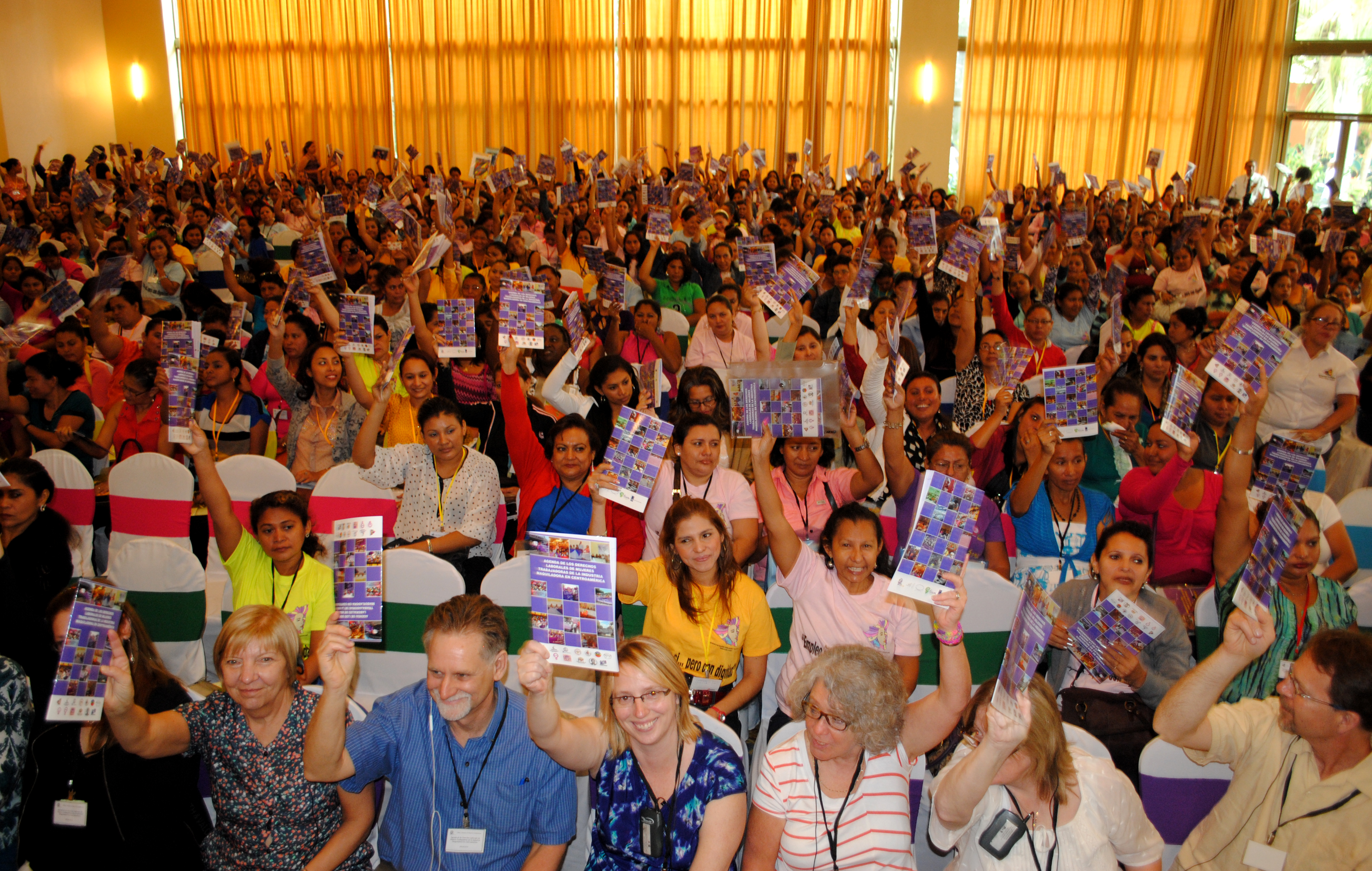WELCOME TO THE ARCHIVE (1994-2014) OF THE MAQUILA SOLIDARITY NETWORK. For current information on our ongoing work on the living wage, women's labour rights, freedom of association, corporate accountability and Bangladesh fire and safety, please visit our new website, launched in October, 2015: www.maquilasolidarity.org
June 3, 2014

Public launch of the Agenda in Managua, Nicaragua
On March 2, the Central American Women’s Network in Support of Maquila Workers (REDCAM) publicly launched a women’s labour rights agenda for maquila workers in the region.
The regional launch took place in Managua, Nicaragua at the annual Colloquium of the Maria Elena Cuadra Movement of Working and Unemployed Women (MEC). National launches of the Agenda have taken place in Honduras and Guatemala.
The “Women’s Labour Rights Agenda for the Central American Maquiladora Industry” is the product of two years of consultation with women maquila workers and women’s and trade union organizations in the Central American region.
The Agenda is endorsed by 11 national women’s organizations and two trade union bodies – the National Committee of Nicaraguan Women Trade Unionists and the Central American Coordinator of Unions in the Maquila. The Central American Women’s Fund and MSN are also signatories to the Agenda.
MSN is working with signatory organizations to present the Agenda to international apparel brands and lobby for changes in their labour standards policies and practices in order to address the priority issues of women maquila workers. The first briefing will take place in Nicaragua in July.
Below are brief summaries of some of the key demands to governments, apparel manufacturers and brands:
Right to employment with a dignified salary:
• Create provisional funds to guarantee payment of statutory benefits to workers in the event of a factory closure.
• Adopt affirmative action policies to prohibit discrimination in hiring.
• Prohibit the contracting of workers on a temporary or hourly basis, and the use of non-standard work schedules to avoid paying legal overtime premiums.
• Guarantee women’s maternity rights, as well as job security, during pre- and post-natal periods.
• Enforce legal requirements for workplace child care facilities.
• Impose sanctions against employers that make salary deductions when workers take time off work for social security medical exams.
• Through the Central American Parliament, promote the adoption of a minimum wage in each country that is based on analyses of their respective basic market baskets.
Right to a safe and healthy workplace:
• Train management personnel, government functionaries and workers on health and safety hazards associated with how work is organized in maquila factories.
• Impose sanctions on employers that fail to establish mixed health and safety committees, fail to comply with international ergonomic standards, or fail to implement legally required preventive measures.
• Train social security personnel and staff in workplace clinics on occupational medicine.
• Carry out regular ergonomic studies and utilize the findings to redesign work stations and work environments.
• Improve the physical conditions and organization of the workplace in order to prevent muscular-skeletal injuries.
• Eliminate 4x4, 3x4 and 5x2 work shifts that violate the right to the eight-hour day, remuneration for overtime, and a safe work environment.
• Improve health and safety inspections to give greater weight to the opinions of workers, and prohibit dismissals of workers based on a diagnosis of their health risks.
Right to sexual and reproductive health:
• Prohibit testing for pregnancy and/or HIV as a requirement for hiring or retaining employment.
• Impose sanctions on employers that demand pregnancy tests as a condition of hiring or that discriminate against women based on pregnancy or maternity.
• Ensure that pregnant women are not forced to do tasks that cause harm to themselves or their babies.
• Ensure that women workers have the right to their statutory maternity benefits and to return to their job without the threat of dismissal or changes in their employment contracts.
Right to Social Security:
• Carry out regular inspections to ensure that employers are respecting the right of workers to be registered with social security and have access to social security health services.
• Monitor the performance of private workplace clinics in order to prevent the provision of poor quality services, illegal charges for such services, or the substitution of private care for access to social security health services.
• Guarantee that personnel working in private workplace clinics are not influenced by their financial or other relationship to the employer.
Right to a workplace free of violence and sexual harassment:
• Improve coordination among relevant government ministries and institutes to better attend to the complaints of women maquila workers concerning violence (physical, verbal, sexual, psychological, and economic) at the workplace.
• Improve preventive mechanisms and legal sanctions against sexual and other forms of harassment and violence against women workers and provide them with effective legal instruments to address these abuses.
• Improve internal complaint mechanisms in the workplace regarding sexual and other forms of harassment and violence against women, and promote educational campaigns among factory personnel.
• Develop information strategies to educate women workers in order to facilitate and attend to women workers’ complaints concerning harassment at the workplace.
• Take legal action to encourage maquila owners to adopt security measures, such as improved infrastructure and public lighting in order to prevent violence against women.
• Provide proper training to personnel in the criminal justice and law enforcement institutions involved in investigations and criminal proceedings in order to ensure that attention given to these cases is of high quality and does not result in the re-victimization of women complainants.
• Ensure that management personnel are trained about these crimes and how to prevent them from happening in the workplace.
The right to training and technical assistance
• Ensure that educational institutions elaborate programs designed for women workers to give them the opportunity to pursue technical and professional careers.
Click here to read the full version (in Spanish)
Click here to read the complete list of demands (in English)